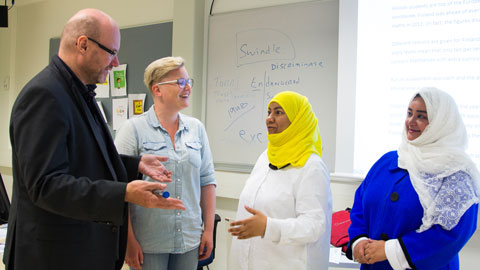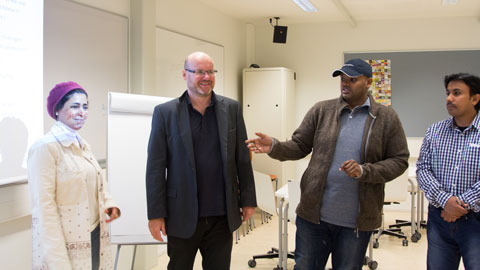Saudi Arabia Develops Its Education by Seeking Ideas from Finland
15.09.2017
Ghadah Ibrahim is clearly inspired by phenomenon-based teaching. That is a teaching method where teachers of different subjects can collaborate and study the same phenomenon from the perspective of many different subjects. It is a novel teaching method for the Saudi teacher, one of the gems she has discovered while improving her teaching skills at the Department of Teacher Education of the University of Turku.

Teacher Neil McLaverty (left) Coordinator Anna Alasuutari, theacher Ebtihal Alsukar and principal Ehsan Bazomah compares the diffences between Finlands an Saudi-Arabic schools.
Ibrahim is one of the 24 teachers for whom the Saudi Arabian government commissioned a six-month Professional development programme in Finland. Altogether there are 117 teachers from Saudi-Arabia in Finland.
Already during their language studies, she has absorbed information about the Finnish education system and chosen her favourite methods.

– I want to make phenomenon-based learning part of my and other Saudi teachers' teaching, says Ibrahim.
Her ambition is just what the Saudi Arabians and the people from the University of Turku and transnational education unit are hoping for. The best practices of different countries shared with others. Finland has been widely recognised as one of the top countries in education and therefore Saudi Arabia, who is developing its own education system, wanted their teachers to learn Finnish methods and skills.
– We study here first and then we will share the knowledge we have acquired with other teachers back in our home country, says Ibrahim.
Saudi Arabia commissioned the training from Finland University which is a joint transnational education organisation of the Universities of Turku, Eastern Finland and Tampere. Transnational education is not a charity or development aid but a service where the buyer pays all the costs in full. However, it still supports the idea of a better world.
– High-quality teacher training is one of the pillars of an education system. By training future teachers to countries where the education systems are in the need of development, we can ethically support educational development in these countries through transnational education, says Coordinator Anna Alasuutari.
Exploring School Routines in August

In the room next door, English Teacher Patrick Gallagher discusses small talk: what are suitable topics and which are the ones that should be avoided. The participants take turns to read a dialogue, consider their answers and discuss the topic.
– We are learning both educational jargon and general vocabulary, says Gallagher.
It is like a basis on which the education package is built on. During the summer, the participants worked hard with Gallagher and Neil McLaverty to improve their English language skills, but things are about to change in mid-August. The Saudi teachers have taken part in actual school life t Turku Teacher Training School by making observations, participating and learning. Each week has its own theme, such as the roles of pupils and teachers in the education system, different learning environments, giving feedback and making evaluations, co-operation between the school and home, or operating as a change agent.
– We have selected teacher tutors from the Teacher Training School and each of them guides 4–5 Saudi teachers. On Fridays, the participants will spend the day at the University and learn the theory behind the week’s theme with their appointed mentor, says Alasuutari.
Finnish Teachers Have More Power and Responsibility
It is quiet in McLaverty's classroom. Everyone is fixed on a fast-paced video.
– With this video, we are learning about formative and summative assessment. Watch it and consider what is the central difference between the Finnish education system and the education in your country, McLaverty encourages and adds: – Remember to always be critical.
The message is understood quickly. Formative assessment is given during the studies and its goal is to help the pupils to develop and improve their performance. Summative assessment is given after the study period is completed and it involves comparing the student's learning with other pupils in the class.

– We do not use formative assessment as much as the Finnish teachers, says Ibrahim.
– And the importance of summative assessment is far greater. We test the pupils all the time whether they have learned the topic at hand and, if not, they cannot proceed in their studies, says Mohammed Zuhair.
Which method do the teachers prefer? The idea behind transnational education is to give the participants the necessary tools, the solutions are made back home.
Principal Ehsan Bazomah already knows that the new methods will be put to use back home. Together with Al-anouod Atotaibi, Wafa Fahad and Ebtihal Alsukair, she is fascinated by the fact that in Finland teachers have to take much more responsibility than their colleagues in Saudi Arabia. Of course, there are instructions on what has to be taught on each level in Finnish schools, but the pedagogic methods and contents of the classes are the teacher's responsibility. In Saudi Arabia, teachers get a weekly programme which they have to follow closely.
But it is not just the Saudi Arabians who are gaining from the experience. Al-anouod Atotaibi and Wafa Fahad promise that, if anyone at school wishes to know, they are ready to tell about their culture and customs to the pupils.
Text and photo: Erja Hyytiäinen
Translation: Mari Ratia